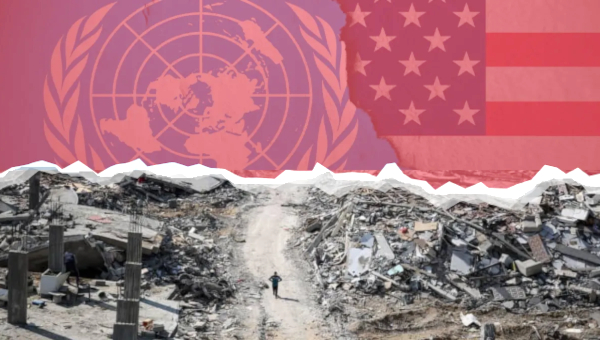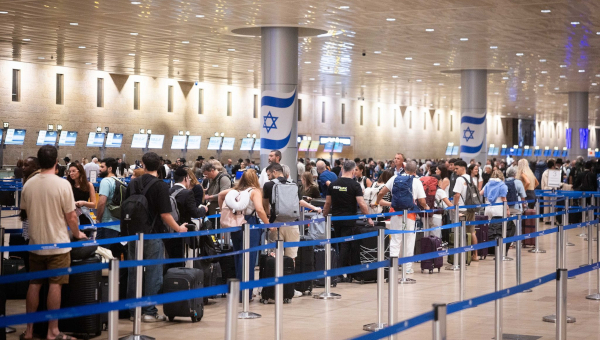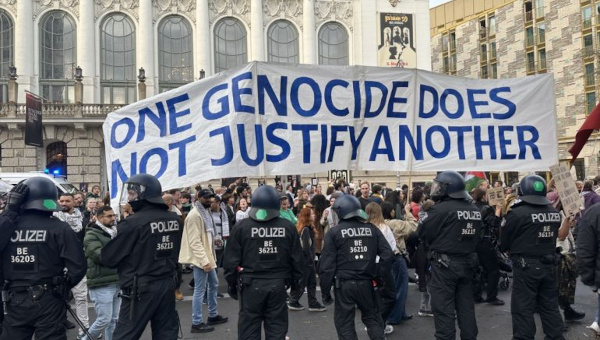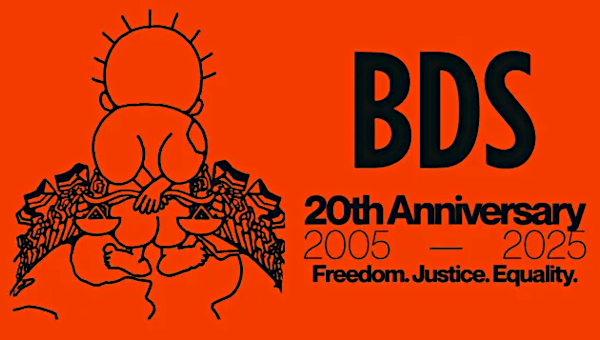Solidarity with Palestine and the Struggle from Below
Israel’s genocidal war against the Palestinians in Gaza shows no sign of ending more than a year after its beginning, while the Israeli occupation army and settlers have continued to escalate their violence in the West Bank, as well as its continuous annexation, by dispossessing the Palestinians and confiscating their lands. Moreover, Israel’s government launched a new war against Lebanon by mid-September 2024, resulting in several thousand deaths and massive destruction, with scenes and images reminding us of the devastation in Gaza.
It is in this context that former US president Donald Trump has been elected against Kamala Harris. Among many other elements, the Democratic Party’s continuous and expanding support of the Israeli genocide against Palestinians played an important role in their defeat. Israel’s war on Palestine and Lebanon has indeed been completely supported by the Joe Biden presidency. Since 7 October 2023, the US has acted in the most hypocritical way. Despite rhetoric calling for de-escalation of the situation, the US has, in practice, allowed Israel to act with impunity. It has provided Israel with all the military equipment it needs to carry out its genocidal war, occupy and colonise Palestinian lands, launch a war in Lebanon, bomb Yemen and Syria, conduct assassinations throughout the region, and escalate military operations against Iran. The US has spent more than $18-billion on military aid to Israel since October 2023.
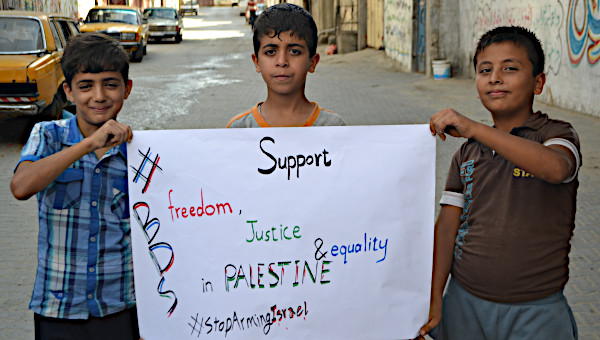
US Foreign Policy – Duopoly
Trump will officially take office in the White House on January 20, 2025. Despite claims by Trump that he will bring about a cease-fire and end to wars in the Middle East, nothing should be expected from his rule. In August 2024, the Republican billionaire stated that if elected, Israel would receive all necessary aid to “end the war” in the Gaza Strip swiftly. As a reminder, Trump’s first term included moving the US Embassy to Jerusalem and supporting Israel’s annexation of the Golan Heights, while also encouraging the normalization between Israel and different Arab countries through the Abraham accords. None of these decisions were challenged by Democrats, in fact, quite the opposite as described above.
Regardless of who is in power in the USA, both the Democrats and Republicans have supported Israel because it acts as their local police force mobilising against threats to US and Western imperialists’ interests in the region, in particular, any revolutionary movements that might emerge that would challenge US control over the area’s strategic energy reserves. Because Israel is a state predicated on the displacement of a people with deep roots on the land Israel claims, a reality that arouses anger and hostility among the region’s masses, Israel is forced to rely on imperial patronage and make itself an instrument against radical change in the Middle East.
At the same time, Israel’s outspoken, unapologetic racist repression of the Palestinian population has become a model that far-right and right-wing neoliberal parties around the world would like to follow: ignoring international law and dealing however they want with non-white populations, whether those are new migrants or other minorities.
The election of Trump, the continuous rise of far right and, the deepening of authoritarian practices in western states could lead sometimes to despair among some sections of the working and popular classes and activists in the Palestinian solidarity movement, particularly as the genocide continues, as well as the support of western imperialist states to Tel Aviv. Furthermore solidarity with the Palestinian struggle and support for the Boycott, Divestment, and Sanctions (BDS) campaign have been increasingly criminalized in Western states, which serves to normalize attacks on fundamental democratic rights by the ruling classes and expanding state control.
Axis of Resistance?
The obstacles to achieving results and victories can lead some within the Palestine solidarity movement and on the left to lose faith in the possibility of change from below and to place their hopes for the liberation of Palestine on the actions of some states claiming to be allies of the Palestinians.
Indeed, some saluting has occurred of the so-called “Axis of resistance” led by the Islamic republic of Iran, describing it as the way forward for the liberation of Palestine. Iran, Hamas’s main regional ally, has, however, sought since October 7 to improve its standing in the region so as to be in the best position for future political and economic negotiations with the US. Iran wishes to guarantee its political and security interests, and is therefore keen to avoid any direct war with Israel. Its main geopolitical objective in relation to the Palestinians is not to liberate them, but rather to use them as leverage, particularly in its relations with the United States. Similarly, Iran’s passivity in the deepening war against Lebanon, and in the wake of the assassination of key Hezbollah political and military cadres, including Secretary General Hassan Nasrallah, also suggests its first priority is protecting its own geopolitical interests. Iran has also not hesitated in the past to reduce its funding for Hamas when their interests did not coincide: Tehran significantly decreased its financial assistance to Hamas after an historic mass uprising erupted in Syria in 2011 and the Palestinian movement refused to support the Syrian regime’s murderous repression of Syrian protesters.
Similarly, some have looked to Turkey and its president Erdoğan as a champion of the Palestinian cause. Despite Turkish Recep Tayyip Erdoğan’s criticism of Israel and his government’s ban on domestic trade with the Israeli state (in place since May 2024), Turkey and Israel maintain close economic ties. According to data released by the Turkish Exporters’ Assembly (TIM), Turkish businesses appear to be bypassing the trade ban by routing exports through Palestinian Authority customs: there was an 423% increase in exports to Palestine during the first eight months of 2024, with exports in August alone surging by over 1150%, climbing from $10-million last year to $127-million [all amounts in USD]. Trade between the two countries has also been ongoing through third countries such as Greece. In addition, Turkey and Israel found common ground during Azerbaijan’s recent military aggression in the Nagorno-Karabakh region, controlled and populated primarily by Armenians. Israeli and Turkish drones, as well as support from both countries’ intelligence services, proved essential to Azerbaijan’s victory over the Armenian armed forces. More than 100,000 Armenians, nearly the entire pre-conflict population, were forced to flee Nagorno-Karabakh and become refugees.
In fact, grassroots progressive forces should not align themselves with imperialist or sub-imperialist states that each compete for political gains and strive to intensify their exploitation of resources and working people. Of course, US imperialism remains exceptionally destructive and deadly through its military, political, and economic powers. But to choose one imperialism over another is to guarantee the stability of the capitalist system and the exploitation of popular classes.
Possibilities of Change from Below?
Left and progressive forces must, of course, defend the Palestinians’ right to resist Israel’s racist colonial apartheid state violence, including through military resistance. Similarly, the Lebanese have the right to resist Israeli aggression. Defending the right of people to resist oppression should not be confused with political support for the specific political projects of Hamas or Hezbollah in their respective societies, nor should it lead us to imagine these parties will be able to deliver Palestinian liberation or that they have a strategy in this direction.
That said, the most important task for those outside the Middle East and North Africa (MENA) region is to win over the left, unions, progressive groups, and existing social movements to build a strong mass popular movement in solidarity with Palestinian liberation and to support the BDS campaign against Israel. The best way to serve Palestinian liberation today is indeed to build strong local popular solidarity movements and push forward BDS campaigns. We need also to cultivate regional and internationalist analyses in our movements, believing in the common interests and common destiny of popular and working classes.
The main task of a large popular movement for Palestine is to denounce the complicit role of our ruling classes in supporting not only the racist settler-colonial apartheid state of Israel and its genocidal war against the Palestinians but also Israel’s attacks on other countries in the region such as Lebanon. The movement must pressure those ruling classes to break off any political, economic, and military relations with Tel Aviv. No one should expect Western ruling classes to easily change their political positions regarding Israel. Never in history have the ruling classes granted genuine democracy or justice except under pressure from working-class mobilization from below.
International solidarity is absolutely essential as Palestinians face not only the state of Israel but also its imperialist backers.
There is a growing awareness that a victory for the Palestinian cause would be a victory for the entire left – for the whole progressive camp opposed to the destructive impulses of neoliberal capitalism and the rise of fascist movements, which are the two dominant political projects threatening popular and working classes today. Weakening Western ruling classes weakens Israeli apartheid and vice versa. Struggling for Palestine, important in itself, is also a way to defend the rights of everyone engaged in challenging this unequal, authoritarian world system. •
This article first published on the Rebel News website.


